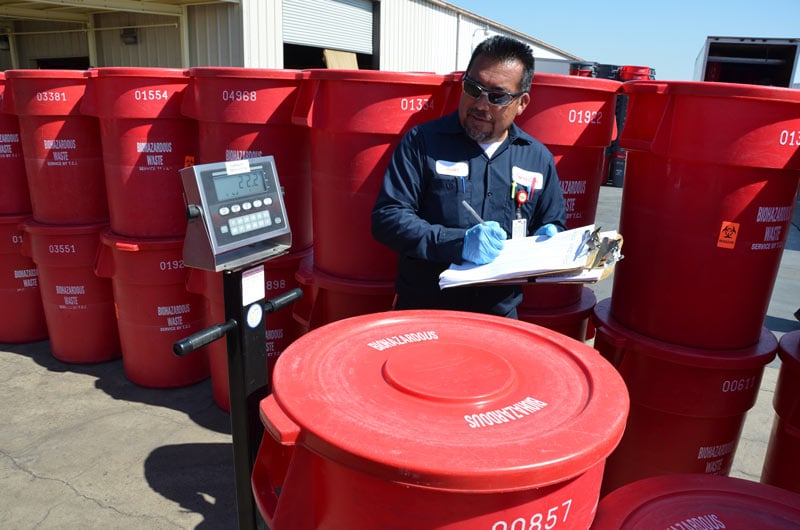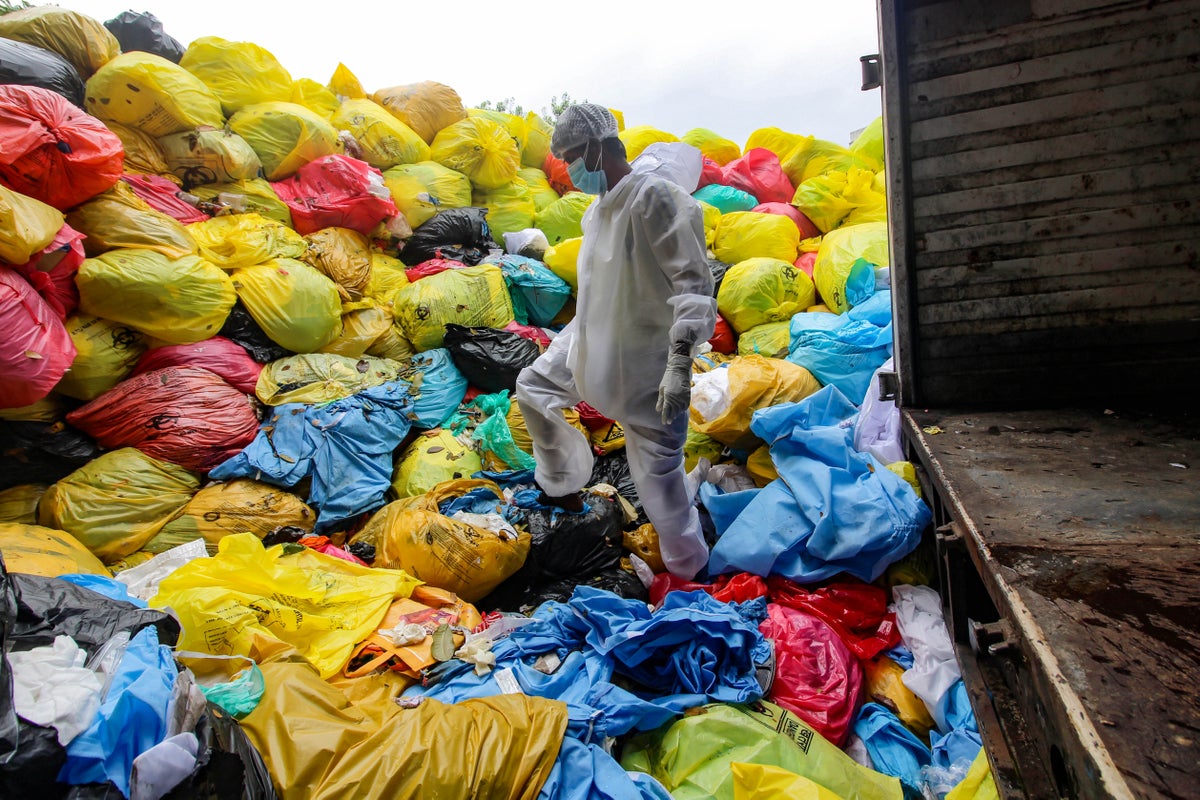Making Sure Safe Handling and Disposal of Medical Waste
Guaranteeing secure handling and disposal of clinical waste is of extremely important value in health care settings. Incorrect administration of clinical waste can posture significant dangers to the environment, public health and wellness, and health care employees. This requires adherence to rigorous standards and protocols for its safe handling and disposal. In this intro, we will certainly discover the importance of appropriate clinical waste management, the risks connected with incorrect handling and disposal, as well as the standards and approaches that can be implemented to ensure its risk-free disposal. Additionally, we will go over the value of training and education and learning for health care specialists in order to keep a safe and tidy healthcare atmosphere. By following these techniques, we can effectively reduce the prospective risks connected with clinical waste.
Value of Appropriate Clinical Waste Monitoring
Appropriate clinical waste administration is of utmost value in ensuring the safety and well-being of healthcare experts, people, and the basic public. Clinical waste refers to any waste generated by medical care facilities during the medical diagnosis, treatment, or immunization of animals or human beings. This waste can pose serious wellness risks otherwise taken care of and thrown away effectively.
One of the main factors why appropriate clinical waste management is important is to prevent the spread of transmittable illness. Medical waste, such as used needles, polluted dressings, and biological products, can bring dangerous pathogens. If not taken care of and thrown away correctly, these virus can be transferred to healthcare employees, clients, waste trainers, and also the basic public, causing the possible break out of conditions.
Additionally, appropriate clinical waste administration helps secure the setting - medical waste removal service. Clinical waste has hazardous products, consisting of chemicals, pharmaceuticals, and contaminated compounds. When not taken care of appropriately, these substances can infect soil, water bodies, and the air, posing a considerable danger to environments and public health and wellness
Moreover, efficient clinical waste administration makes certain compliance with regional guidelines and worldwide requirements. Governments and regulatory bodies have actually developed guidelines and methods to make certain the secure handling, storage, transport, and disposal of clinical waste. Following these regulations is important to avoid legal effects and maintain the credibility and reputation of medical care facilities.
Dangers of Improper Handling and Disposal

If medical waste is not effectively disposed of,Patients can also be subjected to these infectious illness. For instance, if infected needles or various other sharps are not gotten rid of in designated puncture-proof containers, they might unintentionally puncture individuals, leading to prospective infections. If clinical waste is not segregated appropriately, there is a threat of cross-contamination between different types of waste, additional increasing the chances of condition transmission.
Improper disposal of medical waste can also have destructive results on the environment and the public. If medical waste is not dealt with and disposed of properly, it can pollute water resources, dirt, and air, causing the spread of pollutants and conditions. This can have lasting effects on communities and public health and wellness.
Standards for Safe Handling of Medical Waste
Applying efficient methods for the risk-free handling of medical waste is necessary in ensuring the protection of healthcare experts, people, and the public. These standards are important in decreasing the threats connected with the handling and disposal of clinical waste, such as infections, injuries, and ecological contamination.
First and leading, health care facilities should develop a comprehensive waste administration plan that complies with local, nationwide, and worldwide guidelines. This strategy needs to consist of clear directions on waste segregation, product packaging, transportation, labeling, and storage space. It is essential to divide different sorts of waste, such as sharps, infectious materials, pharmaceuticals, site here and non-hazardous waste, to stop cross-contamination and advertise risk-free disposal.
In addition, health care employees need to get complete training on correct waste handling strategies. They ought to be enlightened on the possible threats of clinical waste, the suitable usage of personal protective tools (PPE), and the correct treatments for taking care of, delivering, and getting rid of various types of waste.
Moreover, health care centers must routinely check and audit their waste monitoring methods to make certain compliance with standards. This consists of performing regular assessments, assessing waste handling procedures, and offering responses and training to employee.
Efficient Approaches for Waste Disposal
To guarantee the secure handling and disposal of clinical waste, it is vital to utilize reliable techniques for garbage disposal. Clinical waste can pose substantial dangers to public wellness and the setting if not taken care of and gotten rid of properly. Therefore, medical care facilities and waste administration companies need to execute proper methods to mitigate these dangers.
It entails dividing different types of clinical waste based on their attributes. Medical care centers need to offer clear standards and training to team members on just how to set apart waste appropriately.

Furthermore, medical care centers should team up with accredited waste monitoring companies to ensure correct disposal of clinical waste. These firms have the know-how and devices needed to securely dispose and take care of of clinical waste in conformity with regulations and best methods.
Training and Education And Learning for Medical Care Professionals
Healthcare experts play an important duty in making sure the safe handling and disposal of medical waste with comprehensive training and education and learning. It is essential for doctor to have a deep understanding of the prospective dangers connected with clinical waste and the correct procedures for its management. By receiving proper training, medical care professionals can reduce the potential transmission of infectious illness, avoid environmental contamination, and safeguard both themselves and the basic public.

Moreover, training programs ought to stress making use of individual safety tools (PPE) and proper hand health methods when handling medical waste. medical waste removal. Health care specialists ought to understand exactly how to appropriately get rid of and use of PPE to safeguard themselves from possible direct exposure to dangerous materials. They ought to also be informed on the value of regular handwashing and the proper usage of hand sanitizers to decrease the spread of contagious diseases
Continuing education and learning and routine updates on clinical waste monitoring techniques are essential for healthcare specialists. As policies and standards evolve, it is important to keep healthcare suppliers educated about any kind of modifications in procedures and best techniques. This will certainly guarantee that they stay updated and keep a high criterion of security in disposing and dealing with of medical waste.
Conclusion
Finally, correct handling and disposal of medical waste is important to guarantee the security of medical care professionals, clients, and the environment. Ignoring to comply with policies and standards can cause numerous risks and dangers. Applying efficient approaches for waste disposal and supplying appropriate training and education and learning for health care experts are vital in preserving a secure healthcare environment. By sticking to these techniques, we can alleviate the potential dangers connected with medical waste.
Medical waste refers to any waste produced by healthcare centers during the diagnosis, therapy, or booster shot of pets or humans. If clinical waste is not segregated appropriately, there is a danger of cross-contamination between various kinds of waste, additional increasing the possibilities of condition transmission.
It is vital to divide various types of waste, such as sharps, infectious materials, pharmaceuticals, and non-hazardous waste, to protect against cross-contamination and promote risk-free disposal. WasteX Medical Waste Disposal.
To ensure the risk-free handling and disposal of clinical waste, it is important to use effective strategies for waste disposal. In addition, health care facilities ought to develop a regular waste collection and transport timetable to prevent waste build-up and lessen the danger of mishaps or contamination.